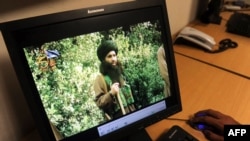ISLAMABAD —
A spokesman for the outlawed Tehreek-e-Taliban Pakistan (TTP), an umbrella organization of Pakistan-based militant groups commonly referred to as the Pakistani Taliban, says its Shura, or leadership council, has selected hardline cleric Mullah Fazlullah as its news leader during Thursday meetings in the North Waziristan tribal region.
A spokesman told reporters by phone from an undisclosed location that Shura participants also voted against holding peace talks with Pakistan's government, citing Islamabad’s alleged covert support of U.S. drone attacks against Taliban fighters, including the strike that killed previous group leader Hakimullah Mehsud earlier this month.
The choice of Fazlullah has dampened hopes of any peace process between the Pakistani Taliban and the government of Pakistan. Nicknamed Mullah Radio for his fiery Islamist radio broadcasts in the Swat valley, Fazlullah is considered hard line even within the Pakistani Taliban movement.
Fazlullah led the militant group's brutal rule in Pakistan's northwest Swat valley in 2008-2009 before a military operation retook the area.
Analysts like former Pakistan Air Force officer Shahzad Chaudhry fear extremist violence may increase in the country under the new TTP leadership.
“How will Mullah Fazlullah react or act in sort of establishing or asserting his leadership: it is of course [a question] related to his personality, which is obviously of that of a fairly violent man because that is what the state of Pakistan experienced against him in Swat," he said. "And although his people were driven out and he managed to escape to Afghanistan, he has been attacking the Pakistani state and its people from across the border.”
Authorities believe that Fazlullah has taken refuge in neighboring Afghanistan and has been ordering cross-border attacks against Pakistani posts as well as civilian targets. His alleged presence on Afghan soil has become another irritant in uneasy relations between Kabul and Islamabad.
The militant commander has claimed responsibility for some of the deadliest attacks on security forces, including the recent bombing of an army convoy that killed a top Pakistani general near the Afghan border.
Pakistani intelligence believes Fazlullah also has links to the attempted killing of activist Malala Yousafzai in Swat in October 2012, an attack that was claimed by Pakistani Taliban. The teenager was openly campaigning for girls’ education in the conservative northwestern area when gunmen critically wounded her.
The incident has since turned Malala, who now lives in Britain with her family, into a figure of international renown.
A spokesman told reporters by phone from an undisclosed location that Shura participants also voted against holding peace talks with Pakistan's government, citing Islamabad’s alleged covert support of U.S. drone attacks against Taliban fighters, including the strike that killed previous group leader Hakimullah Mehsud earlier this month.
The choice of Fazlullah has dampened hopes of any peace process between the Pakistani Taliban and the government of Pakistan. Nicknamed Mullah Radio for his fiery Islamist radio broadcasts in the Swat valley, Fazlullah is considered hard line even within the Pakistani Taliban movement.
Fazlullah led the militant group's brutal rule in Pakistan's northwest Swat valley in 2008-2009 before a military operation retook the area.
Analysts like former Pakistan Air Force officer Shahzad Chaudhry fear extremist violence may increase in the country under the new TTP leadership.
“How will Mullah Fazlullah react or act in sort of establishing or asserting his leadership: it is of course [a question] related to his personality, which is obviously of that of a fairly violent man because that is what the state of Pakistan experienced against him in Swat," he said. "And although his people were driven out and he managed to escape to Afghanistan, he has been attacking the Pakistani state and its people from across the border.”
Authorities believe that Fazlullah has taken refuge in neighboring Afghanistan and has been ordering cross-border attacks against Pakistani posts as well as civilian targets. His alleged presence on Afghan soil has become another irritant in uneasy relations between Kabul and Islamabad.
The militant commander has claimed responsibility for some of the deadliest attacks on security forces, including the recent bombing of an army convoy that killed a top Pakistani general near the Afghan border.
Pakistani intelligence believes Fazlullah also has links to the attempted killing of activist Malala Yousafzai in Swat in October 2012, an attack that was claimed by Pakistani Taliban. The teenager was openly campaigning for girls’ education in the conservative northwestern area when gunmen critically wounded her.
The incident has since turned Malala, who now lives in Britain with her family, into a figure of international renown.
Some information for this report was provided by AFP and Reuters.




